Making Waves in Cape Town’s Coastal Townships
Since the end of apartheid in South Africa, the country has made great strides to lift up disadvantaged communities that identify as Colored and Black. But while some South African children growing up experience the adventures and natural beauty of the Western Cape, others live in communities plagued by poor education, high unemployment, and gang violence.
Nigel Savel, 2018 Fellowship Alumnus, wants to change that. In 2013, Nigel and his wife Sher’Neil founded the 9Miles Project, a nonprofit for vulnerable youth that both teaches them the discipline of surfing and creates a safe space for them to learn, grow, and feel empowered. Nigel is committed to ensuring that all young people have the same opportunities he did, strengthening their futures through the power of surfing and community.
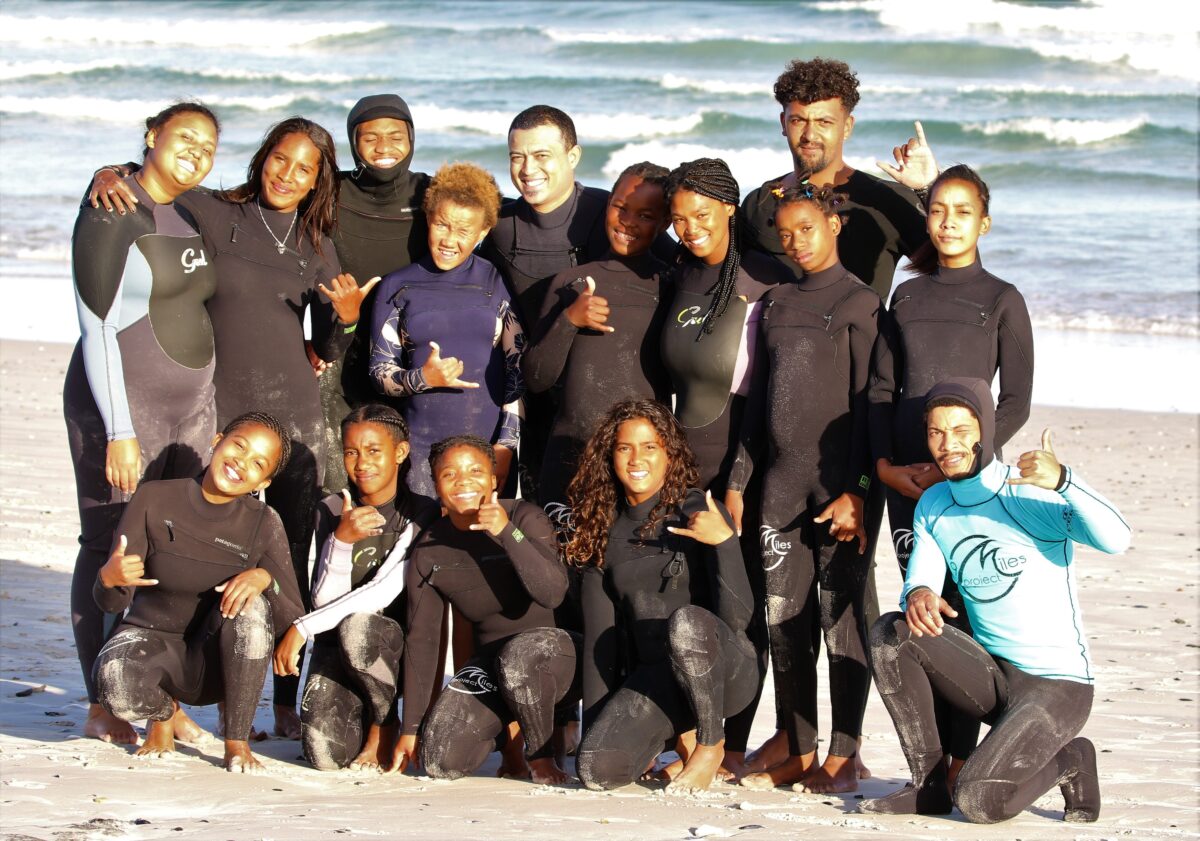
Early ripples of change
Growing up in Strandfontein Village near the ocean, Nigel learned to surf at a young age. As a child, he would race to the beach after school to catch the last waves of the day on his surfboard, a routine that altered the course of his life. The discipline of the sport, he says, instilled in him deep values and principles, including the power of commitment and staying focused, that turned him away from the temptations of gang life in his teenage years.
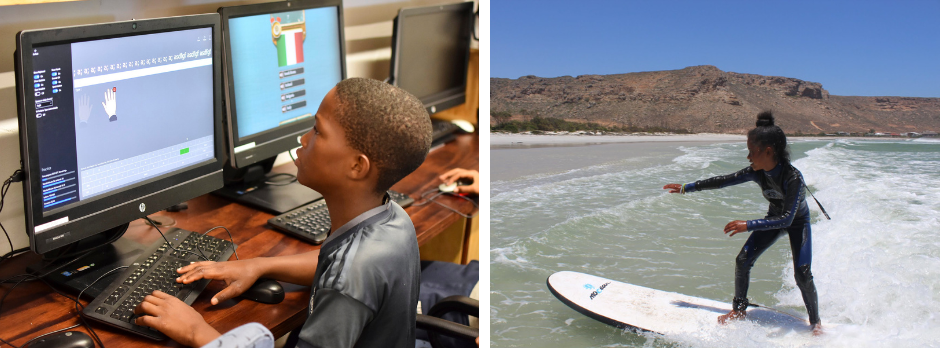
As a young adult, Nigel was further inspired to transform his community and provide opportunities for other vulnerable youths, resulting in the establishment of 9Miles Project. In its first few years, it was a small weekend program that served nine children in one community in the Strandfontein settlement. Nigel soon realized that introducing participants to surfing was just tipping their toes in the water of what they needed to succeed: most of the children could not read or write, and they needed positive, empowering role models. Nigel and Sher’Neil expanded programming to provide literacy, academic, and holistic support, and he eventually quit his job so that he could run 9Miles Project full time.
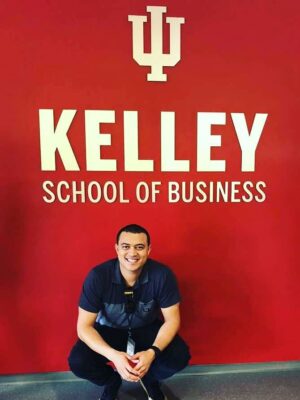
Transforming South African youths by adapting U.S. models
In 2018, Nigel completed a Mandela Washington Fellowship Leadership Institute in the Leadership in Civic Engagement track at Indiana University (IU) in Bloomington, Indiana. During the week spent at IU’s School of Philanthropy, Nigel and his cohort connected with established organizations in the United States that successfully create pipelines for youth to become productive members of society and avoid falling into a life of crime. Connecting the missions of these organizations to his own experience, Nigel adopted the pipeline concept for the 9Miles Project and added goals of creating youth employment opportunities.
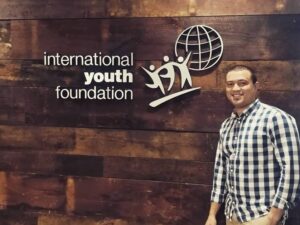
After the Leadership Institute, Nigel was placed at the International Youth Foundation (IYF) in Baltimore, Maryland, for his Professional Development Experience (PDE). During that time, he was exposed to new skills and tools, like social media and digital storytelling, that he has since used to share 9Miles Project’s story with a wider audience. Additionally, IYF introduced him to their Passports to Success program, which promotes the development of essential life skills, such as self-confidence, responsibility and problem solving, through face-to-face, online, and blended learning.
Passport to Success turned out to be exactly the life-skills-building curriculum Nigel needed to support youth in his community in becoming employable. After receiving a grant to implement it at the 9Miles Project, Nigel and his colleagues initially put 200 youth in vulnerable communities across Cape Town through the two-week program, which has become a hallmark of the programming that they implement.
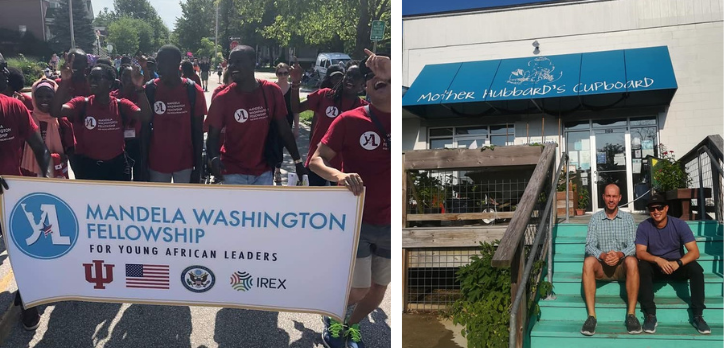
A rising tide raises all boards
Reflecting on his Fellowship experience five years later, Nigel says it all comes down to servant leadership. To Nigel, the Fellowship upholds the legacy of Nelson Mandela, also known as Madiba, through its commitment to fostering pan-African connections between outstanding young people devoted to creating positive change in their communities through ethical leadership. That, says Nigel, is the key way in which Fellowship Alumni continue the legacy of Madiba.
[The Fellowship] causes… authentic love to change people with no strings attached, just unconditional love. To sacrifice so much for the greater good, and to have that insight and foresight… to hold onto hope for a better tomorrow.”
Nigel Savel, 2018 Fellowship Alumnus, South Africa
Since the Fellowship, Nigel and his team have expanded 9Miles Project exponentially, regularly serving more than 120 children across three locations in Cape Town, Eastern Cape, and the West Coast. The organization’s headquarters is at Strandfontein Pavilion on the same beach where Nigel used to surf after school. The Project is sustained in part by social enterprises through a surf shop, surfboard repair shop, and 9Miles Cafe onsite at the Pavilion, which is staffed by current and former beneficiaries of the Project. Nigel credits the Fellowship, particularly his experiences at IU’s School of Philanthropy and IYF, for his success in bringing his young organization to the next level and expanding its impact.
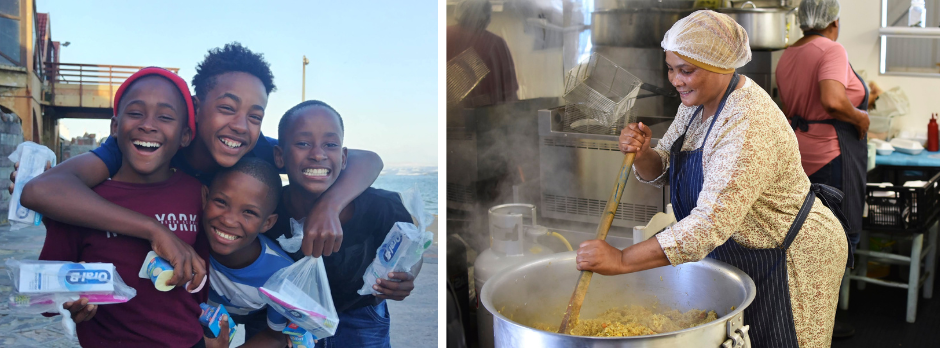
In addition to the physical, mental, and social wellness Nigel and his team provide through surfing and mentorship, they also provide nutrition and food security programs to nearby informal settlements. During the COVID lockdowns, their food programs grew from feeding 90 people in Strandfontein to serving 1,500 meals per day in four communities in need. The 9Miles Project continues to provide two meals per day to 350 children, in addition to meals and snacks during their programs. Nigel hopes to continue building the social enterprises that support 9Miles Project in the coming years, which, in addition to the café and shop, include 9Miles Project apparel, lessons and rentals for both tourists and locals, and a family and community-focused surf membership club. Ten years into this journey, Nigel and his team continue to identify key stakeholders interested in their work and hope to build upon the foundation they have laid to expand their impact to wider swaths of their coastal community.
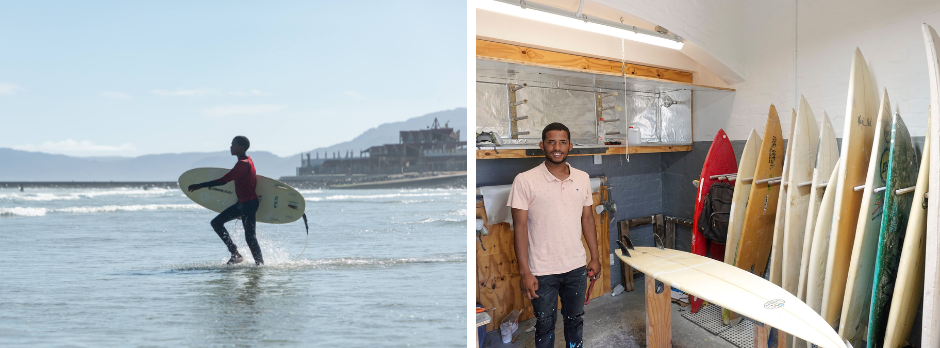
Written by Adrienne Jacobs
Next Story
2023 Reciprocal Exchange
In Liberia